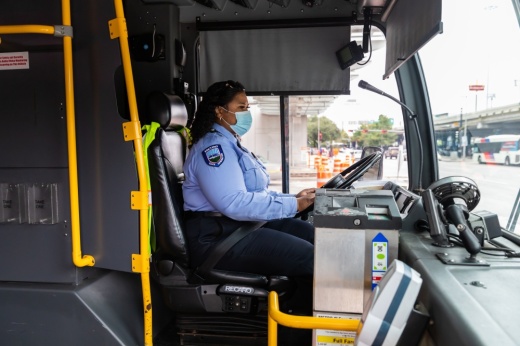A shortage of bus operators cost METRO nearly $10 million in the past year in emergency contracts with private vendors, with the agency most recently allocating $8 million to supplement park and ride services at the June 23 board of directors meeting. The agency also plans to invest $24 million in measures to ensure driver safety and satisfaction, key concerns identified by employees in a late 2021 survey.
“As you know, METRO, as well as many other companies and agencies throughout the nation, are having challenges filling particularly our operations positions,” said Karen Kauffman, METRO’s chief human resources officer, in a June 15 administration committee meeting.
In August, METRO began the Retention Task Force, a multidisciplinary group that met weekly to evaluate ways to increase retention and improve the employee experience. In a survey of employees conducted by the task force in late 2021, operators identified a number of concerns, including safety, pay, lack of recognition and outdated equipment, among others, according to agenda documents.
METRO’s ridership dropped 67% at the start of the coronavirus pandemic in March 2020 but has gradually risen post-pandemic to 5.9 million riders in May of this year—a 46% year-over-year increase, according to METRO data. However, the total number of operators employed by METRO has only increased 0.4% between June 2021 and June 2022, according to data from the agency’s Administration Committee meetings.
Retaining employees
METRO bus operators, who are required to have a commercial driver’s license, earn a starting wage of $20 per hour, according to METRO’s website. However, the skills of bus operators are currently in high demand as shipping companies, such as Amazon and FedEx, need drivers with commercial driver's licenses, too, Kauffman said in a March meeting of the Administration Committee.
In an effort to compete for drivers, METRO has added another employee incentive. The board voted unanimously June 23 to approve a $16 million employee retention program to combat bus operator turnover.
Under the program, eligible full-time METRO employees will receive up to a $6,000 bonus, while eligible part-time employees will receive up to $3,000. Payments will be adjusted for employees who become eligible after the first installment payment. Employees will receive payments in four equal installments in August, December, April 2023 and August 2023.
“We've offered to provide incentives to new hires, people who come in to join us, but this gives us an opportunity to recognize appropriately our working operators and support staff who keep this agency running. I think it's an important step forward for the agency,” METRO Board Member Lex Friedman said during the June 23 meeting.
This is not METRO’s first effort to recruit bus operators with monetary incentives. The agency launched an initiative in June 2021 offering new bus operators up to a $4,000 bonus after six months of employment, METRO Public Information Officer Monica Russo said.
“This is doing right by folks that are working with us, part of the METRO family every single day,” Board Chair Sanjay Ramabhadran said during the June 23 meeting.
Contracting for commuter services
Meanwhile, the need for park and ride bus operators drove the METRO board of directors to unanimously pass an emergency one-year, $8 million contract with a motorcoach transportation provider on June 23.
Under the contract, First Class Tours will provide park and ride transportation services along the I-45 South corridor beginning July 11.
“[It’s] necessitated by our difficulty in recruiting enough drivers. We're still in a very competitive market,” Board First Vice Chair Jim Robinson said at the agency’s June 16 Public Safety, Customer Service & Operations Committee meeting.
First Class Tours will provide their own buses and operators as well as maintenance, training, supervision and other services, said Jeremy Schoech, METRO’s director of contract operated services on June 16. The buses will comply with the Americans with Disabilities Act, be equipped with METRO Q-card readers and offer free Wi-Fi and bathrooms.
“We still are having difficulty recruiting sufficient drivers to bring all of our park and ride services online to the degree that we would like to,” Robinson said. “Consequently, we are entering into this temporary contract with a private carrier to supplement us.”
This is the second of METRO’s three-phased Service Alternatives for Park & Rides plan, which aims to “increase capacity and free up METRO drivers to add to other routes,” Schoech said. The agency implemented Phase 1 on May 16, which was a short-term contract with AFC Transportation servicing routes along the Hwy. 59 North corridor.
Phase 3 is a longer-term plan, Schoech said at the May 19 public safety committee meeting. The agency will issue a request for proposals in hopes of procuring a two-year contract for transportation services with the option to add an additional year.
These measures are in place “until we can build up our hiring,” Robinson said at the June 16 meeting.
“It will be interesting to see how this all unfolds,” Robinson said.
Protecting bus operators
METRO entered another multimillion-dollar contract June 23, this time for safety barriers around bus operators, a measure intended to combat safety concerns.
The METRO board unanimously approved a two-year, $6.2 million contract with NFI Parts to install safety barriers on buses. The barriers will enclose the operator area to provide protection and security for the bus operators, METRO Chief Operating Officer Chuck Berkshire said at the June 16 public safety committee meeting.
METRO bus operators identified safety as a concern in the 2021 surveys conducted by the Retention Task Force, and data from the past year indicates that METRO buses have become a dangerous place to work.
The amount of METRO Code of Conduct Suspension Notices issued by METRO police officers this year for violation of prohibited conduct on METRO property has tripled compared to 2021, according to METRO agenda documents from June 16. Nearly 100 assaults have occurred on METRO local buses this year so far, data showed.
The agency tested out the safety barriers around four years ago, installing them on a small number of buses to obtain operator feedback. No issues arose with the units, Berkshire said at the June 16 public safety committee meeting.
“The feedback from operators was very positive about this,” Robinson said at the meeting.
The agency intends to outfit every METRO bus with a safety barrier by the end of the two-year contract, Berkshire said.





